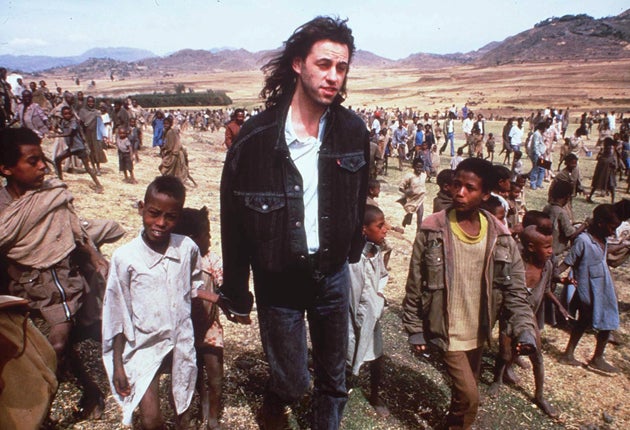BBC under fire for Band Aid 'slur'
Charities in uproar at claims that donations were spent on weapons

Bob Geldof and the Band Aid trust are to report the BBC to the broadcasting regulator Ofcom over a World Service report that millions of pounds raised for famine victims in Ethiopia in 1985 were actually spent on weapons.
A group of Britain's most respected agencies – including Oxfam, the Red Cross, Unicef, Christian Aid and Save the Children – are joining Band Aid in writing an official complaint to the chairman of the BBC Trust, Sir Michael Lyons.
They are to complain of the "false and dangerously misleading impression" created by a report by the BBC World Service's Africa editor, Martin Plaut, which alleged that 95 per cent of the $100m in aid which went to the northern province of Tigray in 1985 had been diverted for military use by the rebel forces which held the area.
A draft of a letter written by the agencies, seen by The Independent, speaks of "disgracefully poor reporting by the BBC which "relied on dubious sources and rumour" and which was "designed to leave an overall impression that the vast majority of resources raised by aid efforts in the mid 1980s largely went on buying arms". In a clearly angry tone the agencies say: "There is not in fact a shred of credible evidence that this happened. There is overwhelming evidence that tens of thousands and even millions were saved by these efforts, which were in fact spurred by reporting by the BBC." The draft concludes: "How the quality of the BBC's work then contrasts with the quality of this specific story now."
The story, which went out in the World Service's Assignment programme – and in a shorter version on Radio 4 in From Our Own Correspondent, as well as on the BBC website – relies on the testimony of two former senior Tigrean rebels. The most senior, Aregawi Berhe, a one-time commander in the rebel army, was expelled from the guerrilla movement in the summer of 1985.
"He therefore not only had a political axe to grind against his former colleagues but he wasn't even in Tigray at the time," said Sir Bob Geldof last night, "so he could not have witnessed these alleged transactions".
The anti-poverty campaigner, who raised $144m for Africa in the Live Aid concert in 1985 – which was spent in six different countries – accused the BBC of "wilfully naive reporting".
"This is a Ross/Brand moment in BBC standards for me," Sir Bob said. "This story has gone around the world on the internet and created a totally false impression of what actually happened. At the time of Live Aid we had journalists crawling all over everything we did trying to find something wrong – and they couldn't.
"And now, on the strength of one disgruntled soldier, the BBC has undermined the faith of ordinary people across the world in the effectiveness of giving to people in their hour of need. It is a disgrace."
It was not just the volatile campaigner who was incensed. The BBC story was "outrageous and very damaging," said Nick Guttmann, director of emergency relief operations at Christian Aid .
"It is palpable nonsense," said Phil Bloomer, director of Oxfam's campaigns and policy division. "The idea that 95 per cent of aid was diverted is beyond belief. We know because we bought the food, we bought the trucks, we took the food in, saw it distributed and then we drove the empty trucks out.
"You have to ask what is the motive of those behind these claims, made by political opponents of the Ethiopian Prime Minister as an election approaches in Ethiopia," he added.
"And you have to ask why the BBC seems to have been prepared to run with these extraordinary claims about our work without even putting in a call to Oxfam before they were broadcast."
"We're not utter fools," said Mr Bloomer. "We've worked for 60 years in some of the most difficult situations in the world with the extremes of human behaviour and have systems in place to safeguard against diversion."
A former British ambassador to Ethiopia, Myles Wickstead, added weight to the aid agencies' condemnation last night. "I'd give no credibility whatsoever to the idea that 95 per cent of aid to Tigray was diverted," he concluded.
"It was too highly monitored, most particularly that of Live Aid. Some money may well have gone astray in Ethiopia in 1985. But nowhere nearly on the scale which the BBC has alleged."
Join our commenting forum
Join thought-provoking conversations, follow other Independent readers and see their replies
Comments